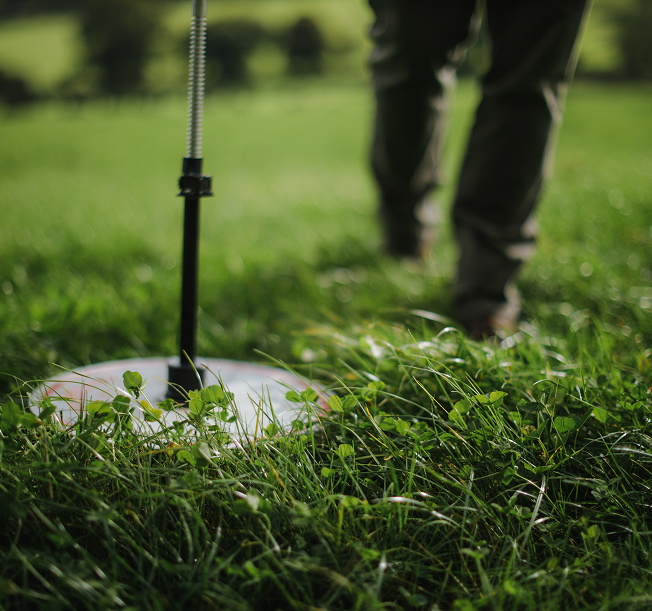Fördelarna med ekologiskt jordbruk:
varför välja ekologiskt nötkött och lamm
Ekologiskt som en hållbar lösning - Bättre för planeten
- Ekologiskt innebär att arbeta med naturen, inte emot den.
- Fördelarna med ekologiska produktionsmetoder för miljön och den biologiska mångfalden har vetenskapligt bevisats.
- Ekologiskt jordbruk minskar risken för miljöföroreningar och hjälper till att minska växthusgasutsläppen genom att kraftigt begränsa användningen av kemiska gödningsmedel och bekämpningsmedel.
- Ekologiska bönder arbetar inom naturliga system och kretslopp på alla nivåer, från jord till växter och djur.
- Ekologiska gårdar är mer ekologiskt diversifierade än icke-ekologiska gårdar.
- Ekologiskt jordbruk stödjer livsuppehället för småbrukare i låginkomstländer.

Ekologiskt jordbruk är bättre för jorden
Ekologiska gårdar
Koldioxidbindning
- Jordarna på ekologiska gårdar binder cirka 1,6 ton koldioxid per hektar varje år.
- Användningen av organiska gödningsmedel som komposterade restprodukter från djurhållning, förbättrade grödor och växtföljder, minskad jordbearbetning och plantering av täckgrödor bidrar till ökad koldioxidlagring.
Klimatmotståndskraft
- Ekologiskt jordbruk kan skydda mot översvämningar eftersom ekologiska jordar lagrar dubbelt så mycket vatten.
- Ekologiska jordar presterar bättre under torka än icke-ekologiska jordar.
Varför jorden är viktig i ekologiskt jordbruk
Att hålla jorden bördig och förhindra jorderosion är en utmaning för alla bönder. Istället för att använda konstgödsel vårdar ekologiska bönder sina jordar genom att använda gödsel, kompost, täckgrödor och växtföljder. Runt om i världen förlorar vi jord mycket snabbare än den bildas, mellan 10 och 40 gånger snabbare. 95 % av vår livsmedelsproduktion är beroende av jord, så det har aldrig varit viktigare att odla på ett sätt som skyddar och bevarar jorden.
- Ekologiskt jordbruk är bättre för jordens långsiktiga hälsa.
- Ekologiska gårdar har ett större utbud av mikrober som lever i jorden – detta hjälper grödorna att växa utan konstgödsel.
Ekologiskt jordbruk är bättre för vilda djur
Pollinatörer spelar en avgörande roll i jordbruket, med 76 % av de kommersiellt viktiga grödorna globalt och tre fjärdedelar av livsmedelsgrödorna som är beroende av insektspollinering. Men de djur som pollinerar och är avgörande för jordbruksproduktionen är på tillbakagång. Denna nedgång beror till stor del på intensivt jordbruk, särskilt den omfattande användningen av bekämpningsmedel som påverkar insektspopulationerna kraftigt.
Bättre för djuren: Ekologisk djurhållning och djurvälfärd
Djurvälfärd är en av de viktigaste aspekterna av ekologiskt jordbruk. Ekologiska standarder kräver att djuren har gott om utrymme och frisk luft, och att de hålls under förhållanden som passar deras naturliga beteende. Mindre besättningar och mer tillgång till utomhusmiljöer innebär att ekologiska djur inte behöver behandlas rutinmässigt med antibiotika och avmaskningsmedel.
Ekologiska normer för djurvälfärd
Tillgång till betesmarker: Har tillgång till betesmarker när väder- och markförhållanden tillåter det.
Tillräckligt med utrymme: Har gott om utrymme både inomhus och utomhus, vilket minskar stress och sjukdomar.
Naturligt bete: Betar och söker föda naturligt på ekologiska betesmarker.
Inga antibiotika: Får inte rutinmässigt antibiotika.
Ekologiskt certifierad
Läs mer om certifieringsprocessen för våra ekologiska produkter.
Grundprinciper
Upptäck principerna för djurhållningsregler för att marknadsföra produkter som ekologiska.